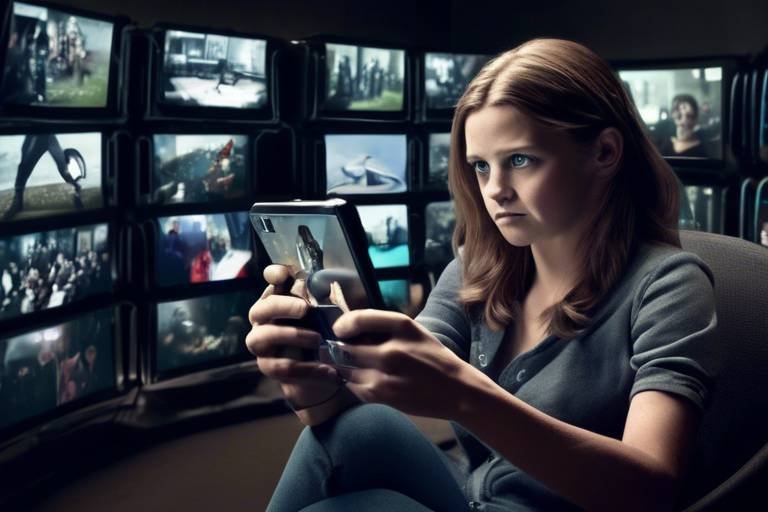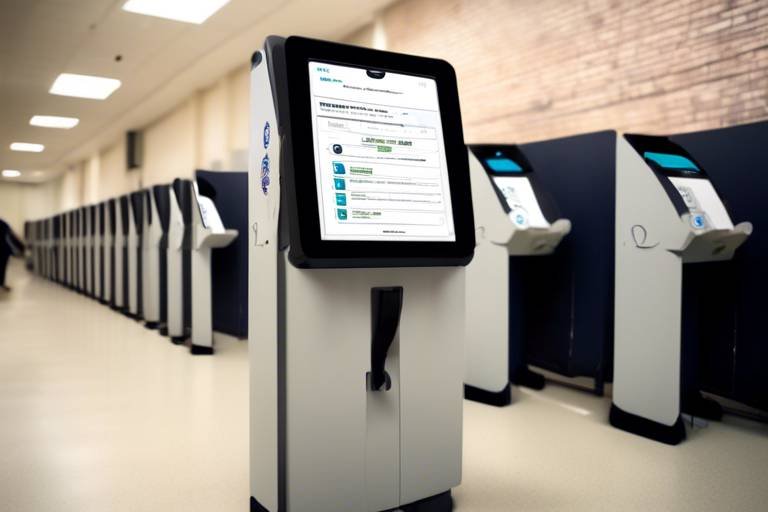How Technology is Shaping the Future of Entertainment
In today’s fast-paced world, the entertainment industry is undergoing a seismic shift, driven primarily by technological advancements. Gone are the days when we had to wait for our favorite shows to air on television or visit a physical store to rent a movie. Instead, technology has ushered in an era of instant gratification, where content is available at our fingertips. This article explores the transformative impact of technology on entertainment, covering innovations in content creation, distribution, and consumption that are redefining how audiences engage with their favorite media.
Streaming platforms have revolutionized how we consume entertainment, offering vast libraries of content on-demand. Services like Netflix, Hulu, and Amazon Prime have not only changed the way we watch TV shows and movies but have also influenced traditional media. No longer are we tied to rigid programming schedules; instead, we can binge-watch entire seasons in one sitting! The growth of these platforms has led to a significant decline in cable subscriptions, forcing traditional networks to adapt or risk becoming obsolete.
Imagine stepping into your favorite movie or game, feeling as if you are truly part of the action. That’s the promise of virtual reality (VR), which is changing the landscape of entertainment by providing immersive experiences. From gaming to movies and live events, VR technology is enhancing user engagement like never before. Gamers can now explore vast worlds and interact with characters in ways that were once confined to our imaginations. Live concerts are also being transformed, allowing fans to experience performances from the comfort of their homes while feeling as if they are right in the front row.
While VR immerses you in a new world, augmented reality (AR) blends digital elements with the real world. This technology has gained massive popularity in gaming, with titles like Pokémon GO leading the charge. Players are no longer just sitting on their couches; they are venturing outside, exploring their neighborhoods, and socializing with others. AR not only enhances gameplay but also fosters community interaction, making it a game-changer in how we engage with entertainment.
Artificial Intelligence is not just a buzzword; it’s actively reshaping the creative landscape. From scriptwriting to music composition, AI tools are becoming invaluable assets for artists and producers. Imagine having a virtual assistant that helps generate ideas for your next blockbuster film or composes a catchy tune! While some may fear that AI could replace human creativity, it’s more about collaboration, enhancing the creative process rather than replacing it. This fusion of technology and artistry opens up new avenues for storytelling and innovation.
Social media platforms like TikTok and Instagram are pivotal in how entertainment is marketed and consumed. They have become the new stage where trends are born and artists are discovered. Think about it: a catchy dance challenge can turn an unknown song into a chart-topping hit overnight! These platforms allow creators to connect directly with their audiences, creating a sense of community and engagement that traditional media simply can’t match. The influence of social media on entertainment is undeniable, shaping not just what we watch but also how we interact with it.
Gone are the days when audiences were mere spectators. With the rise of interactive storytelling, viewers can now influence narratives in real time. Video games and choose-your-own-adventure formats allow players to make decisions that affect the outcome of the story. This level of engagement transforms entertainment from a passive experience into an active one, making us feel like we are part of the story. It’s akin to being the director of your own cinematic journey, where every choice leads to a different adventure.
As we look to the future, 5G technology is set to enhance streaming quality and reduce latency in live events. Imagine watching a live sports event in crystal-clear resolution without any buffering! Faster internet speeds will transform viewing experiences for audiences worldwide, making it easier to enjoy high-quality content on any device. This technological leap is not just about speed; it’s about creating a seamless experience that keeps audiences engaged and satisfied.
Understanding audience preferences is crucial for entertainment companies, and this is where data analytics comes into play. By analyzing viewer behavior and preferences, companies can tailor content to meet the needs of their audiences. This level of personalization enhances viewer satisfaction and fosters loyalty. Whether it’s recommending the next binge-worthy series or curating playlists that align with our tastes, data analytics is the backbone of modern entertainment.
As technology continues to evolve, new trends are emerging in entertainment. From advancements in AI to the integration of blockchain for content ownership, the future is bright and full of possibilities. We can expect to see even more immersive experiences, personalized content, and innovative ways to engage with media. The entertainment landscape is changing rapidly, and those who embrace these changes will be at the forefront of this exciting evolution.
- How has streaming changed the entertainment industry?
Streaming has made content more accessible, allowing viewers to watch what they want, when they want, leading to a decline in traditional cable subscriptions. - What is the difference between VR and AR?
VR immerses users in a completely virtual environment, while AR overlays digital elements onto the real world. - How is AI being used in entertainment?
AI is used in various ways, including scriptwriting, music composition, and analyzing audience preferences to create tailored content. - What role does social media play in entertainment?
Social media platforms help promote content, create trends, and allow direct interaction between creators and audiences.

The Rise of Streaming Services
The world of entertainment has undergone a seismic shift with the advent of streaming services. Gone are the days when we relied solely on cable television or physical media to enjoy our favorite movies and shows. Now, platforms like Netflix, Hulu, and Amazon Prime Video have taken center stage, offering vast libraries of content that we can access on-demand, anytime and anywhere. This transition has not only changed how we consume entertainment but also how it's created and distributed.
One of the most significant impacts of streaming services is the sheer convenience they provide. Imagine being able to binge-watch an entire season of your favorite series without the hassle of commercials or waiting for the next episode to air weekly. With just a few clicks, you can dive into a world of storytelling that spans genres, cultures, and decades. This accessibility has led to an explosion in viewership, as more people than ever are tuning in from their living rooms, bedrooms, or even while commuting.
Furthermore, streaming platforms have democratized content creation. They are no longer just distributors of mainstream media; they are now producers and curators of original content. Netflix, for instance, has invested billions into creating exclusive shows and movies, giving rise to award-winning series like The Crown and Stranger Things. This shift has allowed diverse voices and stories to emerge, catering to niche audiences that traditional media often overlooks. As a result, we are witnessing a golden age of television where creativity knows no bounds.
Moreover, the impact of streaming services extends beyond just content availability. They have also transformed the way we engage with media. With features like personalized recommendations and user-generated ratings, platforms are leveraging advanced algorithms to tailor content to individual preferences. This means that the more you watch, the better the service gets at suggesting what you might enjoy next. It's like having a personal entertainment assistant that knows your tastes inside and out!
However, this rise of streaming services has not come without its challenges. Traditional media companies are scrambling to adapt to this new landscape. Cable subscriptions are plummeting, and networks are forced to rethink their distribution strategies. Some, like Disney, have even launched their own streaming platforms, such as Disney+, to compete directly with established giants. This competition is fierce, and it’s driving innovation at an unprecedented pace.
In conclusion, the rise of streaming services is not just a trend; it’s a fundamental shift in how we consume entertainment. As technology continues to evolve, we can expect even more changes in the landscape of media consumption. Will we see more interactive content? Perhaps a deeper integration of social media? Only time will tell, but one thing is for sure: the future of entertainment is streaming, and it’s here to stay.
- What are the most popular streaming services? Some of the most popular streaming services include Netflix, Hulu, Amazon Prime Video, Disney+, and HBO Max.
- How do streaming services affect traditional cable TV? Streaming services have led to a decline in cable subscriptions as viewers prefer the flexibility and convenience of on-demand content.
- Are there any downsides to streaming services? Some downsides include subscription fatigue due to multiple services, potential content availability issues, and reliance on internet connectivity.

Virtual Reality Experiences
Virtual reality (VR) is not just a buzzword; it’s a revolutionary technology that’s reshaping the entertainment landscape in ways we could only dream of a few years ago. Imagine stepping into a world where you can not only watch a movie but actually feel like you're part of it! With VR, this is now a reality. It offers an immersive experience that engages all your senses, pulling you into a universe of interactive storytelling and breathtaking visuals.
One of the most exciting aspects of VR is its application in gaming. Gone are the days of simply pressing buttons on a controller; now, players can physically move and interact with their environments. Titles like Beat Saber and Half-Life: Alyx have set new standards for what gaming can be, allowing players to wield lightsabers or navigate complex narratives while feeling completely immersed. This level of engagement is akin to being the hero of your own action movie, where every decision you make can change the outcome of your adventure.
But VR isn’t limited to just gaming. The film industry is also exploring this technology, creating experiences that allow viewers to step inside the story. Imagine watching a horror film where you’re not just a spectator but an active participant, navigating through dark corridors or hiding from monsters. This shift from passive viewing to active participation creates a sense of urgency and excitement that traditional media simply can’t replicate.
Live events are also experiencing a transformation thanks to VR. Concerts, sports events, and theater performances can now be experienced from the comfort of your home while still feeling like you're in the front row. With platforms like Oculus Venues, fans can gather virtually, watch performances, and even interact with other attendees, creating a social experience that transcends geographical boundaries. This is particularly significant in a world where travel can be restricted; VR allows us to connect and experience shared moments regardless of distance.
As we look to the future, the potential of VR in entertainment seems limitless. The technology is continuously evolving, with advancements in hardware and software making experiences more accessible and realistic. However, it’s essential to consider the implications of such immersive experiences. As we dive deeper into virtual worlds, questions about our connection to reality and the potential for escapism arise. Are we losing touch with the real world, or are we simply expanding our horizons?
In conclusion, virtual reality is not just a trend; it’s a paradigm shift in how we experience entertainment. Whether you’re a gamer, a movie buff, or a concert-goer, VR offers something extraordinary. It invites us to explore new dimensions of storytelling and engagement, making us active participants in the narratives we love. So, strap on your headset and get ready to embark on a journey that’s as thrilling as it is transformative!
- What is virtual reality? Virtual reality is a simulated experience that can be similar to or completely different from the real world, typically achieved through VR headsets.
- How does VR enhance gaming? VR enhances gaming by providing an immersive experience where players can physically interact with the game environment, making them feel like they are part of the action.
- Can I watch movies in VR? Yes! Many platforms offer VR movies that allow you to step into the film and experience it from a first-person perspective.
- What are the social aspects of VR? VR allows users to connect with others in virtual environments, making it possible to attend events or socialize with friends from anywhere in the world.

Augmented Reality in Gaming
Augmented Reality (AR) is not just a buzzword; it’s a game-changer in the world of gaming, and it’s here to stay! Imagine stepping outside your front door and finding a world where digital creatures interact with the real one, where your favorite characters pop up in your backyard, and where every corner of your neighborhood becomes a new quest. That’s the magic of AR in gaming! It’s like blending the real world with a fantastical layer of digital experiences, creating a playground that’s limited only by your imagination.
One of the most iconic examples of AR in the gaming sphere is Pokémon GO. Released in 2016, this mobile game took the world by storm, encouraging players to explore their surroundings to catch Pokémon. Players were seen wandering parks, streets, and landmarks, phone in hand, searching for elusive creatures. This phenomenon not only brought players together but also encouraged physical activity, making it a unique blend of gaming and real-world exploration. Just think about it: who would have imagined that our smartphones could turn a mundane walk into an adventure?
But Pokémon GO is just the tip of the iceberg. AR technology is evolving rapidly, and game developers are continually pushing the boundaries of what’s possible. Games like Harry Potter: Wizards Unite and Ingress have also harnessed AR to create immersive experiences that blend storytelling with real-world exploration. These games utilize your smartphone’s camera and sensors to overlay digital elements onto your view of the real world, making every interaction feel more significant and engaging.
Here’s a quick look at some key features of AR gaming that make it so appealing:
- Real-World Interaction: AR games encourage players to interact with their physical environment, transforming everyday locations into game zones.
- Social Connectivity: Many AR games promote social interaction, allowing players to team up or compete against each other in real-time.
- Immersive Experiences: By overlaying digital images onto the real world, AR creates a sense of presence that traditional gaming cannot match.
Moreover, AR technology is not limited to just mobile gaming. It’s making waves in console and PC gaming as well. Imagine playing a game where you can see your character fighting in your living room, or where puzzles require you to physically move around your space to solve them. This level of immersion adds a whole new layer of excitement that keeps players coming back for more.
As we look to the future, the potential for AR in gaming seems limitless. With advancements in hardware and software, we can anticipate even more sophisticated and engaging experiences. Developers are exploring ways to integrate AR with other technologies, such as virtual reality (VR) and artificial intelligence (AI), to create hybrid experiences that could redefine how we play games. Just picture a world where you could switch between AR and VR seamlessly, immersing yourself in a fully interactive narrative that reacts to your choices in real-time!
In conclusion, augmented reality is reshaping the gaming landscape by merging the digital and physical worlds in ways we never thought possible. It’s not just about playing games anymore; it’s about experiencing them. As AR continues to evolve, we can expect to see even more innovative applications that will keep players engaged and entertained. So, whether you’re a casual gamer or a hardcore enthusiast, get ready to embrace the incredible adventures that AR gaming has to offer!
- What is Augmented Reality (AR) in gaming? AR in gaming refers to the integration of digital elements with the real world, allowing players to interact with both simultaneously.
- How does AR enhance the gaming experience? AR enhances gaming by creating immersive environments that encourage players to engage with their physical surroundings while playing.
- What are some popular AR games? Some popular AR games include Pokémon GO, Harry Potter: Wizards Unite, and Ingress.
- Will AR gaming become more mainstream? Yes, as technology advances and more developers create AR experiences, it is likely to become more mainstream in the gaming industry.

Artificial Intelligence in Content Creation
Artificial Intelligence (AI) is not just a buzzword; it’s a revolutionary force that’s reshaping the landscape of content creation. Imagine a world where your favorite movies, music, and even articles are crafted with the help of intelligent algorithms. Sounds futuristic, right? Well, it’s happening right now! From scriptwriting to music composition, AI is stepping in to assist creators, making the process faster and, in many cases, more innovative.
One of the most fascinating aspects of AI in content creation is its ability to analyze vast amounts of data. By examining trends and audience preferences, AI tools can predict what type of content is likely to resonate with viewers. For instance, platforms like OpenAI and Google’s DeepMind are already using machine learning to generate scripts and storylines that cater to specific demographics. This means that the next blockbuster could be partially written by a computer!
Moreover, AI is also making strides in the music industry. Imagine a world where your favorite tunes are composed by an algorithm that understands your emotional triggers. AI music composition tools such as AIVA and Amper Music can create original scores in various genres, allowing artists to experiment with new sounds without needing extensive musical training. This has opened up a whole new realm of possibilities for both seasoned musicians and budding artists alike.
However, the integration of AI into content creation isn’t without its critics. Some argue that relying on algorithms could lead to a homogenization of creative expression. After all, can a machine truly understand the nuances of human emotion and creativity? While AI can assist in generating ideas and streamlining processes, the essence of storytelling—those raw, heartfelt moments that resonate with audiences—still requires a human touch. It’s like having a talented sous-chef in the kitchen; they can prep ingredients and suggest recipes, but the chef’s unique flair is what makes the dish special.
Let’s take a closer look at how AI is currently being utilized in various aspects of content creation:
| Application | Description |
|---|---|
| Scriptwriting | AI tools analyze successful scripts and generate new ones based on popular themes and structures. |
| Music Composition | AI creates original music tracks tailored to specific moods or genres, assisting artists in their creative process. |
| Video Editing | AI can automate editing processes, suggesting cuts and transitions based on the rhythm and pacing of the footage. |
| Content Curation | AI algorithms recommend content to users based on their viewing habits, enhancing user engagement. |
As we look to the future, the role of AI in content creation is only set to expand. With advancements in natural language processing and machine learning, we can expect even more sophisticated tools that can assist creators in ways we can’t yet imagine. But while we embrace these technological advancements, it’s crucial to remember the importance of human creativity. After all, AI may help us create, but the stories we tell and the emotions we convey will always be inherently human.
- Is AI taking over creative jobs? While AI is transforming content creation, it is more of a tool that assists creators rather than a replacement.
- Can AI understand human emotions? AI can analyze data and predict trends, but it lacks the true understanding of human emotions that comes from lived experiences.
- What are some popular AI tools for content creation? Tools like OpenAI, AIVA, and Amper Music are widely used for scriptwriting and music composition.

The Role of Social Media in Entertainment
Social media has become the lifeblood of modern entertainment, acting as a powerful catalyst that connects creators and audiences like never before. Platforms such as Instagram, Twitter, and TikTok have transformed how we consume, share, and discuss our favorite shows, movies, and music. But have you ever wondered how these platforms have shifted the dynamics of entertainment? It's fascinating to see how a simple tweet or a viral TikTok video can propel a song to the top of the charts or revive interest in a classic film.
One of the most significant impacts of social media is its ability to create instant buzz. Think about it: a new trailer drops, and within minutes, it’s trending on Twitter. Fans are tweeting their reactions, creating memes, and sharing snippets with their friends. This real-time engagement not only boosts visibility but also fosters a sense of community among fans. For instance, the release of a highly anticipated series can spark a flurry of discussions, theories, and fan art, making viewers feel like they’re part of something bigger.
Moreover, social media platforms have become essential tools for marketing and promoting content. Entertainment companies now leverage these platforms to reach wider audiences through targeted ads and influencer partnerships. Influencers have the power to sway public opinion, and their endorsements can significantly impact a project’s success. Just look at how streaming services utilize social media campaigns to create hype around new releases. They often collaborate with popular creators to showcase exclusive behind-the-scenes content, sneak peeks, or even live Q&A sessions with cast members, which can enhance viewer anticipation and engagement.
Additionally, social media has democratized the entertainment landscape. Independent creators can now showcase their work without needing a traditional gatekeeper. Platforms like YouTube and TikTok allow aspiring filmmakers, musicians, and comedians to reach millions of viewers directly. This shift not only diversifies the type of content available but also enables audiences to discover new talents that might have otherwise gone unnoticed. The result? A more vibrant and varied entertainment ecosystem that reflects a broader range of voices and stories.
However, the influence of social media isn't without its challenges. The pressure to maintain a constant online presence can be overwhelming for creators. They often find themselves balancing their artistic integrity with the need to cater to audience expectations. The phenomenon of cancel culture also looms large, as public opinions can shift rapidly, sometimes leading to severe repercussions for entertainers. It's a double-edged sword: while social media can elevate careers, it can also lead to public scrutiny and backlash.
In conclusion, social media plays a pivotal role in shaping the entertainment industry today. It has transformed how we engage with content, how creators market their work, and how audiences discover new favorites. As we look to the future, it’s clear that the relationship between social media and entertainment will continue to evolve, creating new possibilities and challenges for all involved.
- How has social media changed the way we consume entertainment? Social media allows for real-time engagement and discussion, creating communities around various forms of entertainment.
- What role do influencers play in promoting entertainment content? Influencers can significantly impact a project's success by sharing their opinions and recommendations with their followers.
- Can independent creators succeed through social media? Yes, platforms like YouTube and TikTok provide opportunities for independent creators to showcase their work and gain visibility.
- What are the downsides of social media for entertainers? The pressure to maintain an online presence and the risk of public scrutiny can be challenging for creators.

Interactive Storytelling
In a world where audiences crave more than just passive entertainment, has emerged as a groundbreaking approach that allows viewers to become active participants in the narrative. Imagine diving into a story where your choices shape the outcome, much like a choose-your-own-adventure book, but with the immersive power of modern technology. This shift is not just a trend; it's a revolution that is redefining how we engage with stories across various mediums.
Video games have been at the forefront of this evolution. Titles like The Walking Dead and Life is Strange have captivated players by placing them in the driver's seat, allowing them to make decisions that affect character development and plot progression. These games create emotional connections that traditional storytelling often struggles to achieve. Players feel a sense of ownership over the story, which enhances their overall experience.
Moreover, interactive storytelling is not limited to gaming. Platforms like Netflix have experimented with this format, offering viewers the chance to choose different plot paths in shows like Black Mirror: Bandersnatch. This innovative approach has opened up a new realm of possibilities for filmmakers and content creators. They now have the ability to craft complex narratives that can branch into multiple directions based on audience choices, making each viewing unique.
But what makes interactive storytelling so compelling? Here are some key elements that contribute to its success:
- Engagement: By allowing audiences to make choices, they become more invested in the story.
- Replayability: Different choices lead to different outcomes, encouraging viewers to experience the story multiple times.
- Personalization: Each viewer's journey can be tailored to their preferences, making the narrative feel more relevant and relatable.
As technology continues to evolve, the potential for interactive storytelling is limitless. With advancements in virtual reality (VR) and augmented reality (AR), we can expect to see even more immersive experiences that blur the lines between the real world and digital storytelling. Imagine walking through a virtual landscape where your decisions influence not just the narrative but also the environment around you. The possibilities are as exciting as they are endless.
In conclusion, interactive storytelling is not just a passing fad; it's a fundamental shift in how we experience narratives. As creators harness the power of technology to craft more engaging and personalized stories, audiences will continue to seek out these innovative experiences. The future of entertainment is interactive, and we are just beginning to scratch the surface of what this new era holds.
- What is interactive storytelling? Interactive storytelling allows audiences to influence the narrative through their choices, creating a more engaging experience.
- How does interactive storytelling differ from traditional storytelling? Traditional storytelling is linear, while interactive storytelling offers multiple paths and outcomes based on audience decisions.
- What are some examples of interactive storytelling? Popular examples include video games like The Walking Dead, films like Bandersnatch, and interactive novels.
- Is interactive storytelling the future of entertainment? Many believe it is, as it provides a unique and personalized experience that traditional formats cannot match.

The Impact of 5G Technology
Imagine a world where your favorite shows stream in ultra-high definition without a single buffer. Sounds like a dream, right? Well, with the advent of 5G technology, this dream is becoming a reality. 5G, the fifth generation of mobile network technology, is set to revolutionize how we consume entertainment, bringing faster speeds and more reliable connections that will change the game for viewers everywhere.
One of the most exciting aspects of 5G is its ability to enhance streaming quality. With speeds that can reach up to 10 Gbps, 5G will allow users to download entire seasons of shows in mere seconds. This means that binge-watching your favorite series will become more accessible than ever before, as you won't have to wait around for downloads to complete. The seamless experience will keep audiences glued to their screens, craving more content without the frustration of slow connections.
Moreover, 5G technology significantly reduces latency, which is the delay before a transfer of data begins following an instruction. This is particularly crucial for live events, such as sports and concerts, where every second counts. Imagine watching a live game and experiencing the action in real-time, without any lag between the event and your screen. This improvement will not only enhance viewer satisfaction but also encourage more people to engage with live broadcasts, knowing they won't miss a moment of the action.
Furthermore, 5G opens the door to new possibilities in interactive entertainment. With its high-speed capabilities, we can expect a surge in virtual reality (VR) and augmented reality (AR) experiences that are more immersive than ever. For instance, imagine attending a concert from the comfort of your home, feeling as if you are right there in the crowd, all thanks to the enhanced connectivity that 5G provides. This level of immersion will redefine how we interact with entertainment, making it more engaging and personal.
It’s also worth noting that 5G technology can support a greater number of devices simultaneously. This means that households can enjoy multiple streams of content without sacrificing quality. Families can watch different shows on various devices at the same time, all while maintaining high-resolution video and audio quality. This capability is especially important as more people turn to streaming services for their entertainment needs.
As we look ahead, it’s clear that 5G technology will play a pivotal role in shaping the future of entertainment. The combination of faster speeds, lower latency, and the ability to support more devices will not only enhance the viewer experience but also encourage innovation within the industry. Content creators will have the tools they need to push boundaries, experiment with new formats, and deliver experiences that were previously unimaginable.
- What is 5G technology?
5G is the fifth generation of mobile network technology, offering faster speeds, lower latency, and the ability to connect more devices simultaneously. - How will 5G impact streaming services?
5G will enhance streaming quality, allowing for faster downloads and improved viewing experiences, especially for live events. - Can 5G support virtual reality experiences?
Yes, 5G's high-speed capabilities will enable more immersive VR and AR experiences, transforming how we interact with entertainment. - Will 5G change how families consume media?
Absolutely! With 5G, multiple devices can stream high-quality content simultaneously without sacrificing performance.

Data Analytics in Audience Engagement
In today's fast-paced digital world, data analytics has emerged as a game-changer in the realm of audience engagement. With the sheer volume of content available, understanding what resonates with viewers is crucial for entertainment companies. Imagine trying to find a needle in a haystack; that's how challenging it can be to capture audience attention without the right insights. By leveraging data analytics, businesses can sift through vast amounts of information to identify trends, preferences, and behaviors that shape viewer experiences.
One of the most significant advantages of data analytics is its ability to provide a 360-degree view of the audience. This means that companies can gather data from various sources, including social media interactions, streaming habits, and even online purchases. By analyzing this data, companies can tailor their content to meet the specific needs and desires of their audience. For instance, if a streaming service notices that a particular genre is gaining traction, they might invest more in similar content to capitalize on that interest.
Moreover, data analytics allows for real-time feedback, enabling companies to adjust their strategies on the fly. This is particularly important during major events like live concerts or sports games, where audience reactions can vary widely. By monitoring social media sentiment and engagement metrics, companies can gauge audience reactions and make immediate changes to enhance the experience. Imagine if a live event could adapt its content based on what the audience is enjoying in real time—this is the power of data analytics.
To illustrate the impact of data analytics, consider the following table that highlights key metrics used by entertainment companies to engage their audiences:
| Metric | Description | Importance |
|---|---|---|
| Viewership Data | Tracks how many people are watching a show or event. | Helps determine popularity and potential for renewal. |
| Engagement Rates | Measures interactions such as likes, shares, and comments. | Indicates audience interest and satisfaction. |
| Demographic Insights | Analyzes the age, gender, and location of viewers. | Guides targeted marketing and content creation. |
| Viewing Patterns | Examines when and how often audiences watch content. | Informs scheduling and release strategies. |
However, it's not just about collecting data; it's about interpreting it effectively. Companies must be equipped with the right tools and expertise to analyze this data meaningfully. This is where data scientists and analysts come into play, turning raw numbers into actionable insights. By doing so, they help create a more personalized experience for viewers, ensuring that the content feels relevant and engaging.
Furthermore, as we move into an era where artificial intelligence and machine learning are becoming more prevalent, the ability to predict audience preferences will only improve. Imagine a future where your streaming service knows exactly what you want to watch before you even click on it. This level of personalization is not just a dream; it’s rapidly becoming a reality thanks to advancements in data analytics.
In conclusion, data analytics is not merely a tool; it’s a vital component of audience engagement in the entertainment industry. By understanding and utilizing the wealth of data available, companies can create more engaging, personalized experiences that keep audiences coming back for more. As technology continues to evolve, so will the strategies used to engage audiences, making data analytics an indispensable ally in this ongoing journey.
- What is data analytics? Data analytics refers to the process of examining data sets to draw conclusions about the information they contain, often with the aid of specialized systems and software.
- How does data analytics improve audience engagement? By analyzing viewer preferences and behaviors, companies can tailor their content and marketing strategies to better meet audience needs.
- What tools are commonly used in data analytics? Some popular tools include Google Analytics, Tableau, and various machine learning algorithms that help in processing large data sets.
- Is data privacy a concern in audience analytics? Yes, data privacy is a significant concern, and companies must comply with regulations like GDPR to protect user information.

Future Trends in Entertainment Technology
The future of entertainment technology is an exciting realm filled with possibilities that are set to transform how we experience media. As we look forward, several key trends are emerging that promise to redefine our engagement with content in ways we can only begin to imagine. One of the most significant trends is the continued rise of immersive experiences. With advancements in virtual reality (VR) and augmented reality (AR), audiences will not just watch or listen to content; they will step inside it. Imagine being able to explore a movie set or interact with your favorite characters in real-time. This level of engagement will create deeper connections between audiences and the stories they love.
Another trend is the integration of artificial intelligence (AI) in content curation and creation. AI is already revolutionizing how we discover new content, and as algorithms become more sophisticated, they will tailor recommendations with remarkable accuracy. Picture a world where your streaming service knows your preferences so well that it can suggest not just movies or shows, but also the perfect soundtrack for your day. Moreover, AI is beginning to play a role in content creation, from generating scripts to composing music, which raises intriguing questions about the future of artistic expression.
Additionally, the expansion of 5G technology will significantly enhance our viewing experiences. With lightning-fast internet speeds and reduced latency, we can expect smoother streaming, higher resolution graphics, and seamless live events. Imagine attending a concert virtually, feeling as if you're right there in the front row, all thanks to the power of 5G. This technology will also facilitate more interactive experiences, allowing audiences to engage with content in real-time, whether through live polls during shows or interactive gaming elements integrated into film narratives.
Moreover, the role of data analytics in shaping content will continue to grow. Entertainment companies are increasingly utilizing big data to understand audience behavior and preferences. By analyzing viewing habits, they can create more targeted content that resonates with specific demographics. This not only enhances viewer satisfaction but also fosters a more personalized experience. Imagine receiving notifications about new releases that align perfectly with your tastes, making it easier than ever to find content you'll love.
Lastly, we cannot overlook the impact of social media on entertainment trends. Platforms like TikTok and Instagram are not just places to share snippets of life; they are becoming major players in how entertainment is marketed and consumed. The virality of content on these platforms can propel shows and movies into the spotlight overnight. As creators leverage these platforms for promotion, we can expect innovative marketing strategies that blur the lines between traditional advertising and organic content creation.
In conclusion, the future of entertainment technology is bright, filled with innovations that promise to enhance our experiences and engagement with media. As we embrace these changes, one thing is certain: the way we consume and interact with entertainment will never be the same again. The next decade will be a thrilling journey, and we are all invited to participate in this evolving landscape.
- What role will AI play in content creation?
AI is set to assist in various aspects of content creation, including scriptwriting, music composition, and personalized recommendations. - How will 5G technology affect streaming?
5G will provide faster internet speeds, enabling smoother streaming, higher quality graphics, and enhanced interactivity during live events. - What is the impact of social media on entertainment?
Social media platforms are becoming crucial for marketing entertainment, influencing trends, and creating viral content that can quickly gain popularity.
Frequently Asked Questions
- How have streaming services changed the way we consume entertainment?
Streaming services like Netflix and Hulu have completely transformed our viewing habits. Instead of waiting for a weekly episode, we can binge-watch entire seasons at our convenience. This on-demand access allows us to discover new shows and movies without the constraints of traditional cable packages. It's like having a massive library of entertainment right at our fingertips!
- What role does virtual reality play in modern entertainment?
Virtual reality (VR) is revolutionizing the entertainment industry by offering immersive experiences that transport users into different worlds. Whether it's gaming, movies, or live events, VR allows audiences to engage with content in a way that feels incredibly real. Imagine stepping into your favorite game or experiencing a concert from the front row, all from the comfort of your home!
- Can you explain augmented reality and its impact on gaming?
Augmented reality (AR) blends digital elements with our real-world environment, creating an interactive experience. Games like Pokémon GO have shown how AR can enhance gameplay by encouraging players to explore their surroundings. It's not just about playing a game; it's about social interaction and physical activity, making it a unique way to engage with both technology and friends.
- How is artificial intelligence influencing content creation?
AI is becoming a game-changer in content creation, from generating scripts to composing music. By analyzing trends and audience preferences, AI tools can help creators produce content that resonates more deeply with viewers. It's like having a smart assistant that not only understands what people want but also helps bring those ideas to life!
- What is the significance of social media in entertainment today?
Social media platforms such as TikTok and Instagram have become essential marketing tools for the entertainment industry. They shape trends, promote new releases, and foster community engagement. It's where audiences connect with their favorite stars and discover new content, making social media a powerful ally in the world of entertainment.
- What is interactive storytelling and how does it change the narrative experience?
Interactive storytelling allows audiences to influence the direction of a narrative in real time, creating a more personalized experience. Video games and choose-your-own-adventure formats enable players to make decisions that affect the outcome of the story. It's like being the director of your own movie, where every choice you make leads to a different adventure!
- How will 5G technology improve streaming and live events?
5G technology is set to revolutionize the way we experience streaming and live events by providing faster internet speeds and lower latency. This means smoother streaming, higher quality video, and a more immersive experience during live broadcasts. Imagine watching a live concert with virtually no lag—it's going to change the game!
- How do entertainment companies use data analytics to engage audiences?
Data analytics plays a crucial role in understanding audience preferences and behaviors. Entertainment companies analyze viewing patterns and feedback to tailor content that meets the needs of their viewers. It's like having a crystal ball that helps them predict what we want to watch next, ensuring we stay engaged and satisfied!
- What future trends can we expect in entertainment technology?
As technology continues to advance, we can expect exciting innovations in entertainment. From enhanced virtual reality experiences to more personalized content delivery through AI, the future is bright. It's an ever-evolving landscape that promises to redefine how we interact with media, making it more engaging and immersive than ever before!



















